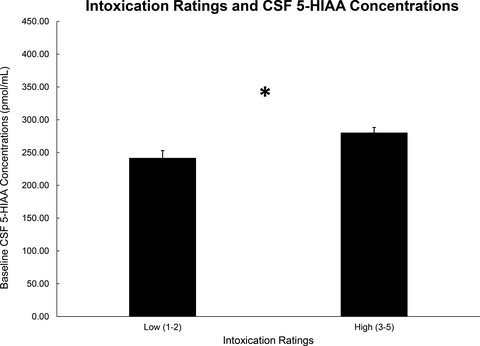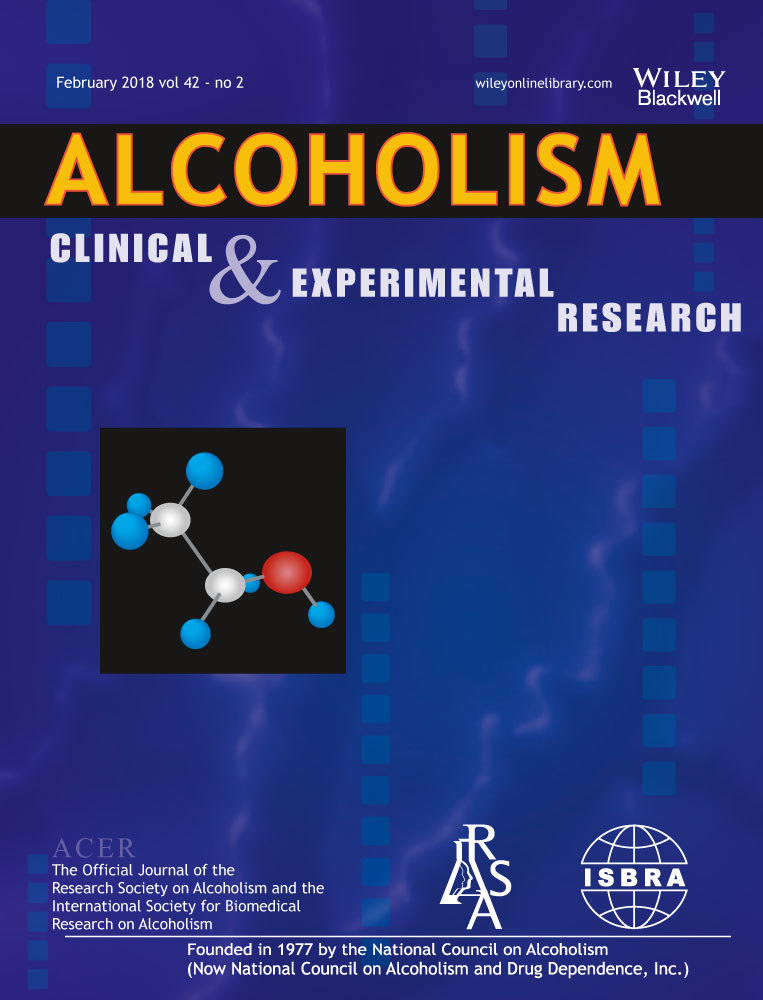Low Inherent Sensitivity to the Intoxicating Effects of Ethanol in Rhesus Monkeys with Low CSF Concentrations of the Serotonin Metabolite 5-Hydroxyindoleacetic Acid
Abstract
Background
Type 2 alcoholism is characterized by low serotonin system functioning and has a high degree of heritability, with offspring of alcoholics often showing a reduced response to the intoxicating effects of ethanol (EtOH), which is thought to be marker for future alcohol use disorders (AUDs). As such, an important aim of studies investigating the origins of AUDs is to understand the relationship between serotonin system functioning and level of intoxication. A nonhuman primate model was used to evaluate observational ratings of sensitivity to EtOH and to further investigate the relationship between central serotonin activity and behavioral response to EtOH.
Methods
Cerebrospinal fluid (CSF) concentrations of 5-hydroxyindoleacetic acid (5-HIAA) were obtained from 4 cohorts of alcohol-naïve, adolescent rhesus macaques (N = 82, 45 females, 37 males). One to 3 months after the CSF sample, subjects were administered a standardized intravenous EtOH bolus (males: 2.1 g/kg body weight, females: 2.0 g/kg body weight), placed into an open-top, clear plexiglass chamber suspended from the ceiling, and their latency to escape was recorded as a measure of the degree of intoxication. Thereafter, subjects were rated using a Likert scale for the degree of intoxication during a 30-minute observation period.
Results
Our results indicate that latency to escape from the chamber was associated with intoxication ratings (p = 0.0009) following the standardized intravenous administration of EtOH. Low CSF 5-HIAA concentrations predicted short escape latency (p = 0.007) and were associated with low intoxication ratings (p = 0.02), indicating that low central nervous system (CNS) serotonin functioning is related to relative insensitivity to the intoxicating effects of alcohol.
Conclusions
Our study shows that, in monkeys exposed to alcohol for the first time, objective measures of intoxication are associated with subjective ratings for intoxication, and both were associated with CSF 5-HIAA concentrations. Our data confirm and extend the finding that low CNS serotonin functioning is predictive of intrinsic low sensitivity to the intoxicating effects of EtOH.
Graphical Abstract
Cisternal CSF concentrations of the serotonin metabolite 5-HIAA were obtained from adolescent alcohol-naïve rhesus monkeys. Shortly after, they were infused with an intravenous dose of ethanol (EtOH) and rated for intoxication. Subjects rated as low in intoxication exhibited low CSF 5-HIAA concentrations. This finding suggests an association between impaired central serotonin functioning and relative insensitivity to EtOH, and that impaired central serotonin functioning may lead to a low level of response to alcohol, both of which are characteristics of Type 2 alcoholism.





